Erstellt am: 3. 2. 2017 - 12:00 Uhr
Head of an Industry: Ben Lovatt and the Skull Store
Reality Check Special
Listen to a Reality Check Special with Johnny Bliss in an informal chat with Ben Lovatt, the animal conservationist-turned skull collector, at his shop, the Skull Store, in the Canadian city of Toronto.
Saturday, February 4th, 12-13, and afterwards seven days on demand.
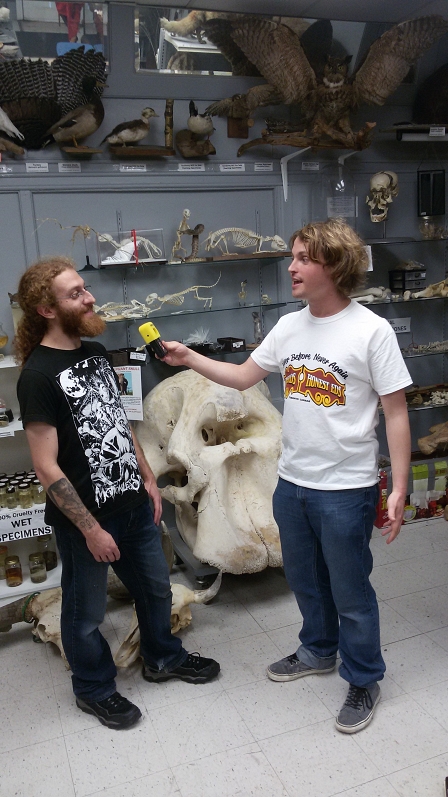
Johnny Bliss
In my line of work, I meet many extraordinary characters, people who have chosen to live in an unusual way, to the point that they become newsworthy enough for people like me to flock around them like moths to a flame.
* Speaking of which, special thanks are due to the Canadian sci-fi writer Robert J Sawyer, for bringing Ben and his Skull Store to my attention.
Even by those standards, Ben Lovatt is one hell of a guy*.
What I knew about him going in was that he sold skulls and bones and exotic cultural artifacts from the store he and his brother founded together, the Skull Store. I imagined a shy, socially-awkward fellow more practiced at talking to body parts than other living people. To be honest, on my trip over, I wondered if he would even talk to me, and how he would sound on the radio: if this would even work.
In this regard (as with pretty much every other regard), Ben and his Skull Store blew all of my expectations completely out of the water.
Let’s start with the location: In a suburban area, far from Toronto’s bustling downtown core, the Skull Store (and oddity shop) maintains a nearly invisible storefront on a perfectly forgettable street. You wouldn’t find the place by accident, and you wouldn’t go unless you really wanted to; I needed well over an hour to get there on public transportation.
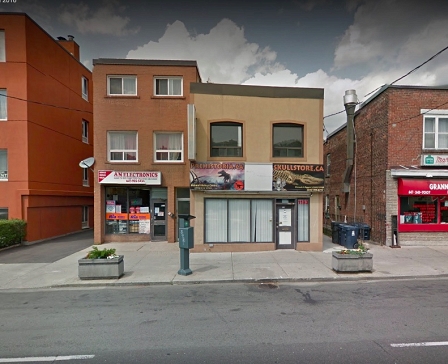
Skull Store
The second you step in, however, you find yourself in another world. You are surrounded by taxidermic animals, and aged war shields from New Guinea, and bones, so many bones (and, of course, skulls) from so many different animals. You’ve entered into the realm of Frankenstein and cackling mad scientists, voodoo doctors, shamans. It doesn’t seem real.
Visit the Skull Store, or Prehistoria, the Natural History Centre online!
Ben, by contrast, is the most friendly and approachable guy you’re likely to ever meet. With a wiry frame and a shock of red hair, and the wry humour of an academic mixed with the infectious enthusiasm of a person who really, really loves their job, Ben looks nothing like the dour mortician-type I was expecting; if I would have met him at some cocktail party instead of in a store full of skulls, I would have pegged him as a bookseller perhaps, or a birdwatcher, or… or a model train enthusiast.
I don’t know; definitely a career hobbyist, someone who found a way to turn his fascinations into a source of income. Just, “skulls and other body parts” would not have been my first guess.
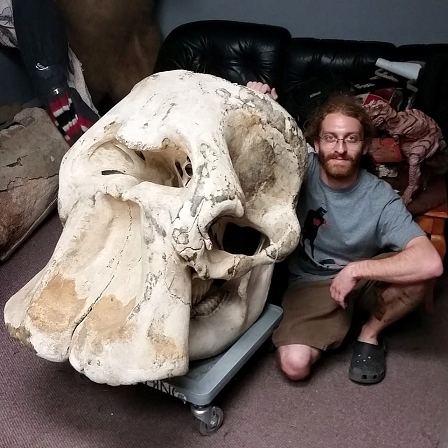
Ben Lovatt
How he got into this
Ben: It was actually an unexpected consequence of our animal conservation work. Importers of wild animals are decimating the planet’s wildlife. So we worked on breeding captive animals, and then we realized, we can stop you from sneaking a lion into Canada, but what’s to stop you from shooting a lion and importing it? So now we just source the animals that die in Canadian zoos to counter the demand for hunted animals.
So you would say that there’s even a conservation initiative behind the heart of your work.
Ben: Well, that’s actually the heart and soul of our work. It’s creating a sustainable alternative to an industry that is covered in bloodshed.
How did you come to the point where, like, you decided to move onto specifically, um…. collecting exotic artifacts from different animals, dinosaurs, etcetera?
Ben: For us, it was gradual. We started off with a few dinosaur bones. I was taking care of two hundred animals at a time, reptiles and things. So I was like, “well, if you’ll buy a gecko or a lizard, maybe you’ll buy a dinosaur”. So I started off with a backpack full of crystals and fossils, and going into different stores downtown Toronto, being like, ‘so... it looks like you don’t have a dinosaur tooth, do you want a dinosaur tooth?’ and from there, it became a traveling salesman thing. We’d load up the back of the van, pull up to a trade show, and pop the hood in the parking lot, and be like ‘so, we’ve got some bodies in the trunk’, you know? And it just snowballed.
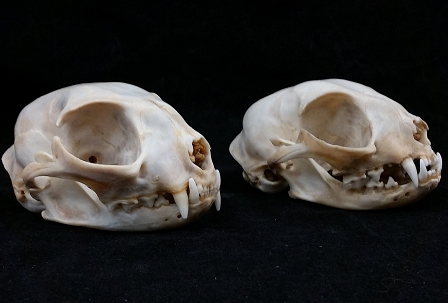
Skull Store
How the store attracts clients
Ben: We actually have a full cabinet of human skulls right now. There’s a lot of heads out there, and a lot of them pass through my shop. If you google “buy skulls”, I’m the top result, which means every guy out there who’s shooting something out in the bush who shouldn’t be, finds me. So we work closely with wildlife authorities, INTERPOL, and conservation agencies all over the planet. And when we get offered a rhino tusk that’s still covered in blood, we know who to report it to, to make sure there’s a takedown.
So… Literally, if I’m anywhere in the world, and I google “buy skulls”, you are the first result.
Ben: Yep, that’s me.
That’s quite a distinction! You should be so proud!
Ben: I never expected to be the ‘Head’ of this industry!
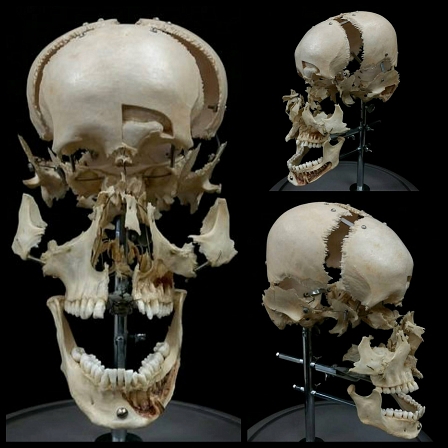
Skull Store
Who are the clients
Ben: Our customers are a bit of everyone. You would think it’d be more of like the radical, dyed-hair, crazy oddball people, and we get those, don’t get me wrong. they’re very interesting people. But we also get more of the clean-cut people too. One of our best customers came in, he bought our other human brain. And he’s like, ‘I teach Grade One.’ And this is a normal guy, he’s got plain clothes, very quaint, thick-rimmed glasses. You wouldn’t expect that this guy literally has a mummy head in his closet, and dozens of human organs and stuff, and he’s like ‘I don’t really bring them to class’.
You never know who’s going to walk up to your booth, and be like, ‘you’ll never guess what I found dead at the side of the road!’ I mean, it’s something that a lot of people find a way to connect to. Everyone thinks they are the only one into this. And then they find my social media and there’s fifty thousand other people… We kinda brought [together] all these oddball people, and create a cohesive community out of it.
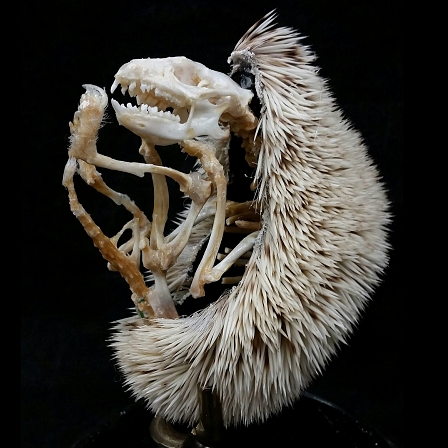
Skull Store
Does anybody ask for refunds?
Ben: It’s very rare for people to ask for a refund, because you see what you’re getting to start with. But the most peculiar instance definitely tested the boundaries of customer service and where it’s boldly gone. We sold a human bone to someone in the United States, just a femur bone, a leg bone. They called to make sure the address was right, they made sure the payment went through alright, everything was great. [It’s] about two weeks later, when we get a call from the person, saying ‘You need to take this bone back’. And we’re like… ‘why?’ ‘I bought this bone to conduct spells. And the spirit that I have conjured is a very angry spirit. This is not the kind of spirit I want to have around.’
I’m just like, ‘oooookay, and what should I do about this?’
Like, ‘You need to take it back! But I can’t touch the bone. It’s a haunted bone. I threw it in my barn, I can’t even go into my barn right now. So you need to issue a refund, and you need to send someone down to my farm in the Central United States, and remove this bone from my property!’
And I’m like, ‘Um, sorry, but our return policy does not cover the Undead’. I’m sure that’s the first time in customer service that’s been uttered!
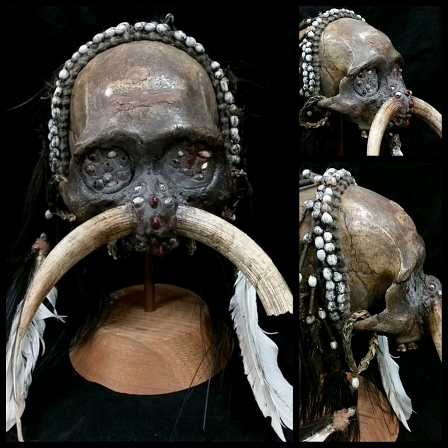
Skull Store
How he finds bones and fossils
Ben: Every spring and every fall, my brother drives and I hop in the passenger seat and we go out to Cape Breton, Nova Scotia, and we do a full coast-to-coast trip. I have, with my brother, pulled two dead whales - pilot whales - off the beach in Nova Scotia. We’re beachcombers, so five kilometres into a hike, we find a whole dead rotting whale. So, we’ve got a couple hunting knives… because what else are you going to have in your pocket? - and we start hacking this whale apart.
And then we’re like, ‘how the heck are we getting this to the car? How the heck are we doing anything with this?’ So, yeah, there I am, hauling, you know, six vertebrae at a time over my shoulder, an hour walk with this thing trailing the smell of whale all behind me. We get into the van, and then we’re like, ‘wait a second… do we need a permit for this?’ Sure enough, there’s a quarter million dollar fine if you don’t!
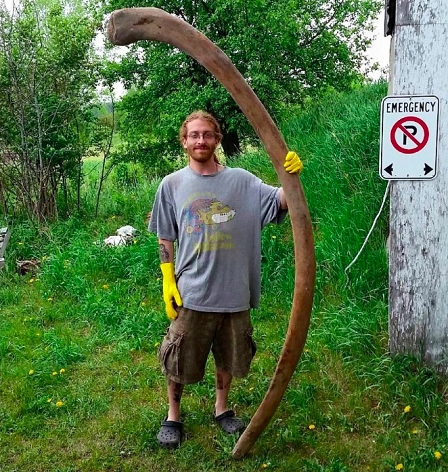
Ben Lovatt
Ben: So, we call the government and the government’s like, ‘well, what’s the environmental impact? How many trucks are hitting the beach? What’s your crew like? What damage are you going to do to our eco-system?’ and I’m like, ‘me and my brother, a Dodge Caravan, and a couple hunting knives’. All the say is, ‘buy some Febreze’, and they gave us the permit. Sure enough, that was a very long eighteen hour drive. We had our heads out the window, all Ace Ventura-style.
We also like hunting for dinosaurs. So we go out to the Badlands a few times a year, in Alberta. So we push far into these canyons, and I’m walking along a ledge, looking for dinosaur bones, doing my thing… and the ledge breaks under me! So I clutch onto the rocks, slide down maybe six or seven feet until I hit the next ledge, and I’m at the edge of a precipice here, looking down. My brother’s coming to help pull me back up the hillside, and I’m like, ‘well, when am I going to be HERE again?’ So, clutching onto the rock for dear life, I took a look for dinosaur bones, and… unfortunately there was nothing cool right there.
Stuff you can buy at the Skull Store
Ben: We had the shrunken head of a child once, from the Jivaro in Ecuador.
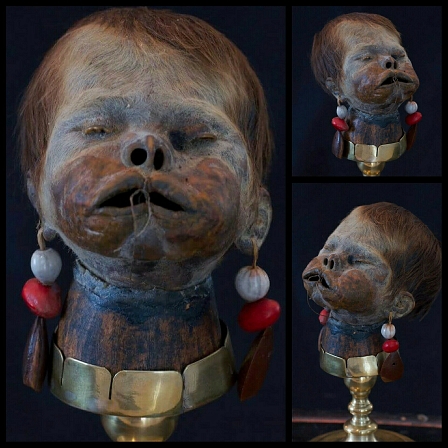
Skull Store
Ben: Although some people frown upon trading in tribal relics, for them, once a head was shrunk, the spirit was gone. In fact, the shrinking process is what cast away the spirit to prevent hauntings and other issues along those lines. So once it was done, in their eyes, it was basically the sea shell that you’d find on the beach. In fact, they were fascinated that, you know, explorers and white men wanted them! We saw them as headhunters, because they had skulls and they had human parts on display. They saw us as the headhunters because we had traveled across the entire ocean to pick up some dead guy’s head.
The most expensive thing we’ve ever brokered was a real sabre-toothed tiger skull. It was a beautiful specimen. It was almost two feet long, the teeth on it were almost a foot long, it was fantastic, and that one ended up retailing around $30,000 (US). The shrunken head was about $12,000. But our average sale definitely doesn’t average anywhere near that. In those instances, it was museums and large galleries around the world.
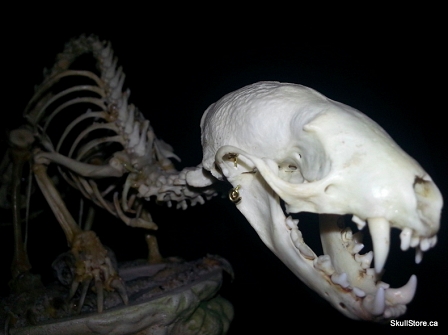
Skull Store
What’s the silliest thing you have in your collection?
Ben: Probably my sixty pound piece of dinosaur poop. It is quite remarkable in that, from one side, it looks very very much like a dinosaur had just walked off. But it’s been cut and polished, and inside it’s mineralized into a beautiful agate crystal with a myriad of reds and purples and blues. From one side, it looks like a beautiful work of art, from the other side it looks like you gotta plug your nose and walk the other way.
We also have one of the most unusual oddities you’re ever going to come across: it’s called a Phantom Shield. And, at first, it doesn’t look like much. It just looks like a big wooden board [made out of a] piece of bark of a large tree with the Phantom crudely painted on, the comic book hero. But actually, it’s a tribal artifact that stems from the cross-cultural contamination of American soldiers in World War II.
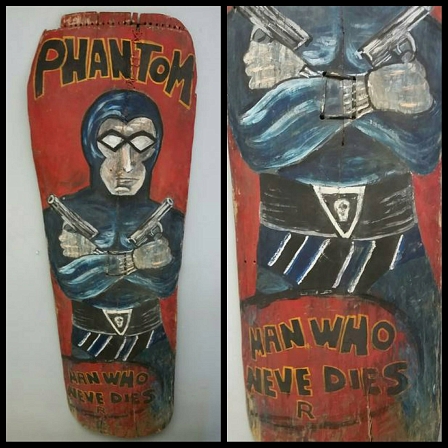
Skull Store
Ben: During the World War, you wouldn’t have crates and crates of novels flying around the world, it was a waste of space. So comic books provided easy entertainment that was effective for shipping and carrying around on you. And the Phantom was the Guy at that point, with his slogan ‘the Man Who Never Dies’. So when US soldiers were stationed with the natives in the northern New Guinea highlands, they had to trade something. But the natives didn’t really have a concept of fiction.
They had mythology. It wasn’t just like fluff entertainment. So, their only way of perceiving a comic book, was as a Holy Scripture. They see this guy, the Phantom, with his guns blazing and he’s immortal, and they’re like, ‘Your God is so much cooler than my God!’
So instead of painting deities on their war shields, they started painting superheroes, because who’s gonna be better in battle? A guy with a spear, or a God with two guns [that are] locked and loaded? It’s one of those strange cultural things, where this is a real war shield, used in the 1950s.
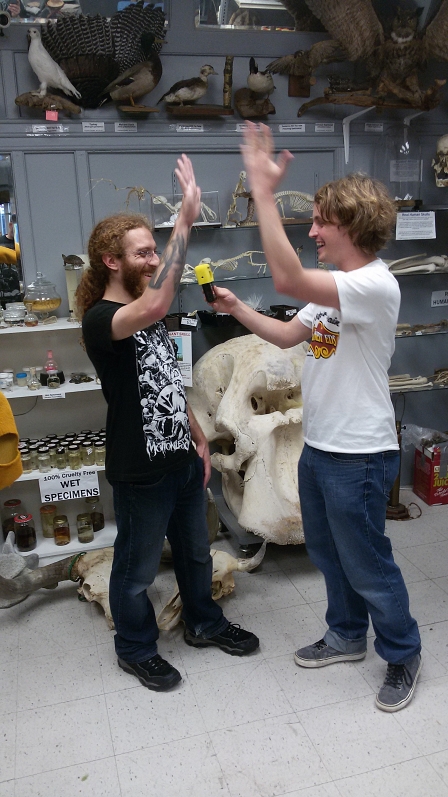
Johnny Bliss
FM4 Reality Check Special on Saturday, February 4th
Listen to a Reality Check Special with Johnny Bliss in an informal chat with Ben Lovatt, the animal conservationist-turned skull collector, at his shop, the Skull Store, in the Canadian city of Toronto.
Saturday, February 4th, 12-13, and afterwards seven days on demand.
If you miss the program, you can still stream it via the Reality Check podcast or at fm4.ORF.at/7tage.
--
PS. Just in case you’re wondering about where the items in the Skull Store come from, Ben told us that the human specimens are from retired doctors who were obligated to purchase real items for their studies in school. He said the knowledge the doctors gained from these specimens have saved countless lives and he and his brother are honoured to continue their respectful legacy.
The tribal skulls were willingly and intentionally traded by the tribes with the outside world. The styling and techniques used in the decoration of the skulls allows specialists, like Ben and his brother, to determine if the skull is an ethnographic export piece or a true aboriginal heirloom.
They also keep up to date with repatriation efforts around the world, including refusing to deal or own specimens from the Maori of New Zealand and North American aboriginals, as their cultures are requesting the return of items. The Skull Store’s tribal skulls have no special significance historically to the tribes they are associated with, so they have no desire for their return, and if that were to change in the future, Ben would happily and respectfully oblige their wishes.


